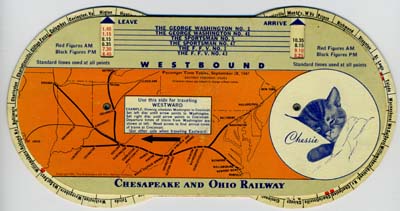Riding on That New River Train
By Margaret Moore Meador

C&O train schedule showing departure and arrival times for Hinton and Montgomery, 1947.
This story is excerpted from an interview Michael Meador conducted with his mother, Margaret Moore Meador (1924-2012), in 1993. She tells of her daily commute from Hinton, the Summers County seat, to attend the West Virginia Institute of Technology (now West Virginia University Institute of Technology) in Montgomery between 1941 and 1943. It recalls a time in southern West Virginia when trains were the only reliable means of transportation in southern West Virginia. –ed.
Education was very important in our household because my father, Virgil Everette Moore, dropped out of school in the third grade to go to work to help support his family. Looking back now, that doesn’t seem possible, but there weren’t any welfare agencies then. When my grandfather died in the early 1900s, Daddy had to drop out of school and go to work to help support his family. I’m talking hard labor, like farming, mining, busting rocks, and cutting timber! Daddy always had a complex about not having an education, but I don’t think it really hit him about how important education was until he got drafted in World War I. He would often tell us about his army induction—where they asked for any man with a college or high school degree to come forward or men with technical training, such as engineering or mechanics, to step out. Even men who could type were given special jobs. He would often say that he was left with the group of uneducated men that could only cut trees and dig ditches, and he always felt that is why he was assigned to an army engineering company that dug ditches, built railroad tracks, and cut trees on the battlefields in France. He must have been close to the frontlines because he would tell us about being gassed with mustard gas.
After the war ended, Daddy secured a job working for the C&O as a brakeman. He worked hard to educate himself through correspondence courses but never got over the embarrassment that he had only gone through the third grade. He had an obsession that his children would have the educational opportunities that he never had. He was always very proud of the fact that all three of his children would eventually finish college, and, had he lived, he would have been very proud that we had all excelled in life.
As far as I know, I was the first person in my family to graduate from high school, and I was also the first person to graduate from college! It’s pretty incredible to think that Daddy insisted that his daughter receive an education in 1941! At that time, most parents were satisfied if their children finished high school, and girls were just expected to marry and have children! He sent me to college!
Mother also had a rough upbringing. She grew up in a large family in the Raleigh County coal camps. Grandpa Greer was a mine foreman and fathered several children. Unfortunately, he and my grandmother didn’t get along too well. As a foreman, he tended to move the family frequently, and Mother attended several elementary schools. Her family lived in free company housing because of Grandpa Greer’s job.
When Mother was in the sixth grade, her father left home for work one day, and he never returned! At first, they didn’t know what had happened to him, but, after about a week, they learned that he had abandoned them! He had taken up with another woman and moved to a different coal camp. The company had a rule that he was entitled to only one rent-free house, and it was the one that he was living in. This was a disaster for Mother’s family because the company quickly evicted Grandma and all of her children. They were homeless and had nowhere to go! This seems incredible in this day and age, but they were just turned out of their home with all of their furniture!
Fortunately, Mother’s oldest sister, Rosie, had gotten married and was living in a coal camp near Mount Hope. She and her husband were able to find everyone temporary housing and help Grandma and the older children find jobs. Mother went to work as a hired girl in a miner’s boarding house ironing clothes. She found lodging with a family by the name of Moore that needed help with a new baby. As these things go, Daddy (Virgil Moore) was the brother of Jack Moore, who was the father of the baby where Mother was staying. This is where Daddy met her. When they got married, she was only 16.
You can read the rest of this article in this issue of Goldenseal, available in bookstores, libraries or direct from Goldenseal.